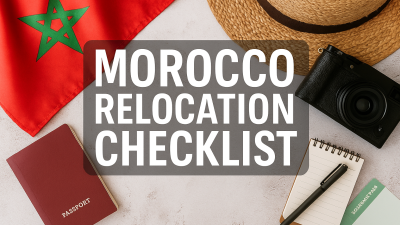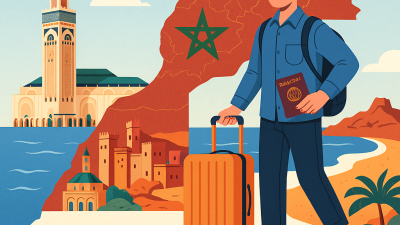Thinking about relocating to Morocco in 2025? That’s an exciting move — but like any international relocation, it takes more than packing your bags and hopping on a flight. Whether you’re a remote worker, a retiree looking for sunshine, or just ready for something new, this guide will walk you through the process in a simple, step-by-step way.
Let’s talk logistics, paperwork, budgets, and real-life tips — the stuff you wish someone had told you before you landed.
Step 1: Understand the Visa Situation
First things first — you’ll need to check Morocco’s visa rules. The good news? Most travelers can enter Morocco without a visa for up to 90 days. But if you’re planning to stick around longer, you’ll need to apply for a Long Stay Visa (Type D) before arrival.
Here’s the basic process:
- Apply at your nearest Moroccan consulate
- Once approved, it’s valid for 3 to 12 months
- After arriving in Morocco, you’ll convert that into a residency permit (called carte de séjour)
Documents you’ll likely need:
- A valid passport
- Proof of income or employment
- A Moroccan address (can be a rental agreement or host confirmation)
- Several passport-sized photos
- The application form (usually in French)
If you’re overwhelmed — don’t worry. Local expats and Facebook groups are great sources of help. You can also ask a local lawyer or relocation consultant if you want professional support.
Step 2: Finding a Place to Live
Let’s talk housing. You don’t have to commit to a long-term lease right away — in fact, we recommend starting with a short-term Airbnb or furnished rental for your first month or two.
Once you’re settled in and familiar with neighborhoods, you can switch to a longer-term place. Here’s what to expect:
- One-bedroom apartments in city centers range from $250 to $500/month
- Cheaper options are available outside city centers or in smaller towns
- Villas, riads, and furnished homes are available too if your budget allows
Popular expat-friendly cities:
- Marrakech (culture and coworking)
- Casablanca (business and international schools)
- Agadir (beach town, relaxed vibes)
- Rabat (clean, quiet, capital city)
Where to search:
- Avito.ma and Mubawab.ma (Moroccan real estate platforms)
- Local real estate agents (they often speak French only)
- Expat Facebook groups with rental listings
Pro tip: Always visit the apartment in person before signing, or have someone trustworthy do it for you.
Step 3: Know Your Monthly Budget
Let’s break down a basic solo expat budget in USD:
| Expense | Monthly Estimate |
|---|---|
| Rent (1BR) | $300–$500 |
| Groceries | $150–$200 |
| Transportation | $30–$60 |
| Coworking/Wi-Fi | $20–$50 |
| Misc. & Lifestyle | $100–$200 |
| Total | $600–$950 |
Keep in mind, if you cook at home, use public transport, and avoid tourist traps — Morocco can be very affordable.
Step 4: Setting Up a Local SIM and Internet
The moment you arrive, you’ll want to get a Moroccan SIM card. It’s cheap, fast, and easy.
Here’s what to do:
- Walk into any telecom store — Inwi, Maroc Telecom, or Orange
- Ask for a prepaid SIM card
- Show your passport (no residency card needed)
You’ll have 4G speeds in most urban areas, and internet cafes and coworking spaces are also widely available.
Recommended apps to install:
- inDrive (for affordable rideshares)
- Google Translate (Darija or French to English)
- MarocMa (for official services)
Step 5: Opening a Moroccan Bank Account (Optional)
Want to pay rent or utilities via local bank transfer? You’ll eventually need a Moroccan bank account.
Here’s what to expect:
- You must have your residency card to open most bank accounts
- Banks will issue you a RIB (Relevé d’Identité Bancaire), which you’ll need for bills
Top expat-friendly banks:
- Attijariwafa Bank
- BMCE Bank of Africa
- Banque Populaire
Bring your residency card, passport, proof of address, and patience — things take longer than you might expect.
Step 6: Adjusting to the Local Culture
You’ve got your visa, apartment, and SIM card. What next? Time to blend in and enjoy the ride.
Here’s how to adapt like a local:
- Learn some Darija or French — even a little helps
- Expect a slower pace with more social rituals (greetings matter!)
- Fridays are holy days — avoid government appointments
- Say “Salam” when entering a room — it’s warm and polite
Moroccans are known for hospitality. You’ll be invited for tea more times than you can count. Accept it. These relationships matter.
Bonus: Things You Don’t Want to Miss
- Try a Friday couscous lunch with a local family
- Visit your neighborhood hammam (public bathhouse)
- Join a language exchange meetup to meet locals
- Explore souks (markets) in different cities
- Take weekend trips to the Atlas Mountains or the Atlantic coast
Living in Morocco isn’t just about affordability — it’s about experiencing something richer, deeper, and slower.
Final Thoughts: What You’ll Be Glad You Knew
Relocating to Morocco isn’t hard, but it’s not 100% intuitive either. Take it step by step. Be open. Be flexible. Be curious.
You’ll probably get lost, use the wrong word, or show up late to your first appointment. That’s all part of the experience. What matters most is your attitude.
Plan what you can. Prepare for what you can’t. And remember — Morocco is a country that rewards patience, openness, and a willingness to embrace the unknown.
FAQs: Moving to Morocco
Q1: Can I move to Morocco without a job lined up?
Yes, but you’ll need to show proof of income (retirement, freelance, or remote work) to apply for a residency permit.
Q2: How long does it take to get the residency card?
It varies by city, but generally takes 1 to 3 months. You’ll receive a temporary receipt while you wait.
Q3: Is Morocco safe for solo expats?
Yes. Violent crime is rare. Use common sense, especially in crowded places or tourist areas.
Q4: Do I need to speak French or Arabic?
Not at first, but learning basic Darija or French helps immensely — especially with paperwork and daily errands.
Q5: Can I work remotely from Morocco legally?
Yes. Many digital nomads work online from Morocco using the 90-day visa or by applying for long-stay residency.
Ready to make the leap? Your Moroccan chapter starts now. And trust us — it’s going to be one to remember.


